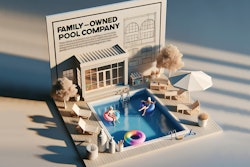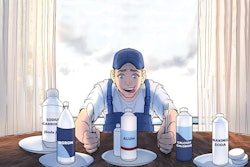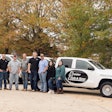
In the good old days, marketing was a pretty simple thing: You’d do the Yellow Pages, a radio ad and maybe a commercial on TV if you had the money. Nowadays, it’s a bit more complex.
Now we have “digital marketing,” which largely includes anything you can find on the Internet: websites, social media, reputation management via sites like Yelp, search rankings and more.
Israel Saari, digital marketing manager for BioLab, has nearly 20 years of experience in the area and helps pool and spa retailers navigate the sometimes-confusing waters of digital marketing. Here, he shares the common mistakes he sees around the industry and how you can avoid them.
Don’t let your website fall out of date.
“Dealers have a tendency to think that once they have a site, they’re finished. So there’s not a lot of updates there,” Saari says. “And I don’t fault them — they have a lot things to do and their budgets and time are limited.”
Take time on occasion to update with the current hours for the season, upcoming sales/events, etc. Your website’s appearance should also be periodically refreshed — after all, your website often serves as a first impression that, fairly or unfairly, reflects upon you and your business.
“A lot of perception comes from the website. Frequently, if the website is outdated and looks like it was built 10 years ago, that’s a negative judgment on a store. And that customer may explore other options,” Saari says.
Do keep your website simple.
“Some websites are overloaded with what the owner thinks is important, which is maybe an encyclopedia of products and a listing of every O-ring and every item they carry. The true product customers are looking for is the person — the dealer is the product,” Saari says.
Your website, he adds, should be relatively easy to navigate, with no more than five or six pages, and reflect your personality wherever possible. (Try adding photos of your team or events you’ve held so visitors get a sense of the people behind the brand.) And don’t forget to include calls to action, such as, “Call us,” “Click for more information,” or “Fill out this form.”
Don’t spend all your time on Facebook.
Of all the components involved in digital marketing, Saari finds social media to be the most popular among pool and spa dealers — and perhaps a bit overblown.
“I believe there’s an expectation out there that the Facebook page will immediately lead to sales or will immediately lead to some increased customer presence,” Saari says. “Some dealers spend too much time making sure their Facebook page is managed and not enough time making sure their website is converting customers.”
That’s not to say you should skip the Facebook page altogether, just think of it differently.
“It’s a great customer retention tool. If I’m shopping your store and if I like your brand and you’re treating me like family, I now have an affinity toward you and your business and I want to express my appreciation by liking your page on Facebook, or I might subscribe to your newsletter. These are the ways we show we’re fans of that brand,” he says.
Do claim your web presence.
When people have a need, like, say, pool and spa chemicals, what are they going to do? Hop on the computer and do a local search. But you need to make sure your business can be found as easily as possible.
“The business has to be ‘claimed,’ as they say, so your location can be updated with information about your hours and your photos and you can respond to reviews,” Saari says.
The easiest way to start is by visiting Google Places for Business (google.com/placesforbusiness). Joining enables your business to be seen on Google+, Google Maps and in search. You’ll also be able to respond to reviews. (See more on that below.)
Yet Google is just one of many online directories. The more directories you’re included in, the better. And while you could seek out each one and add your company’s info, Saari recommends an easier way: Moz Local, a site that takes business information and supplies it to the major directories.
“It’s an incredible tool that shows you exactly how you rank on all of these directory listings, like Google Places, for example. It’s just a fantastic resource for a dealer that is committed to spending some time to make sure they’re listed properly.”
Another bonus: When your business is listed in several directories in a consistent fashion, your ranking on Google may increase, Saari says.
Do keep an eye on reviews.
We talked about your website serving as a first impression of you and your business. But in truth, many potential customers make a decision about your business before they even visit your site by checking out your listing on Google Places.
“If a potential customer sees four or five reviews that are negative, the decision’s made: ‘I’m probably not going to do business with this location,’ or, ‘I’m going to explore an alternative,’ both of which can lead to a loss in sales,” Saari says. “What’s critical there is just understanding decisions are made prior to even the website being engaged, which is really not a great opportunity to claim someone.”
This damage can be compounded when you haven’t claimed your business, as explained above, since you wouldn’t be notified of reviews, let alone have a chance to respond to them.
“If we claim our local listing and are paying attention to what’s coming through, we can engage and be proactive,” he says.
Do solicit positive reviews — but do it slowly.
Generally, people who are unhappy are more likely to go out of their way to write about it online than those who had a good experience — unless they’re prompted, Saari says.
“It might be something as simple as asking your best customers, ‘Would you mind going online and giving us a review on our Google Places page?’” he says. “It might be something like what a dealer in Portland did: He created a forum with a link that says, ‘If you had good service and want to give us some positive feedback,’ and it links directly to his Google Places page or some of his other properties where you can leave a review. If you’re unhappy or there’s a complaint, the link goes to a form that goes directly to him.”
But a word of caution: Resist the temptation to flood your Google Places and Yelp pages with a wave of reviews. These sites have become savvier in recent years in light of spam and fake reviews; when a sudden flood of reviews arrives, some may be flagged as spam.
“What I recommend is to try to get one review a month, or every other month. If you get six or seven reviews in a year, your online presence will look better than the majority of your competitors who have none or only negative reviews,” Saari says.
Don’t ditch what’s working.
“I may be different from most digital marketers in that I don’t tell our dealers to stay away from the traditional stuff,” Saari says. “I think digital marketing absolutely needs to be part of the mix of what’s already working for the dealer. If you say Yellow Pages is working for you, then do Yellow Pages. If that’s where you’re seeing success, great, but also consider some things online to balance that. Different shoppers shop in different locations.”
In the big, wide world of marketing, digital marketing is, for many, a wild new frontier ripe for exploring. And Saari encourages pool and spa dealers to do just that.
“Honestly, the dealers that are thriving and are incrementally improving their businesses are those that are exploring and trying new things on digital,” he says.
Comments or thoughts on this article? Please e-mail [email protected].








































